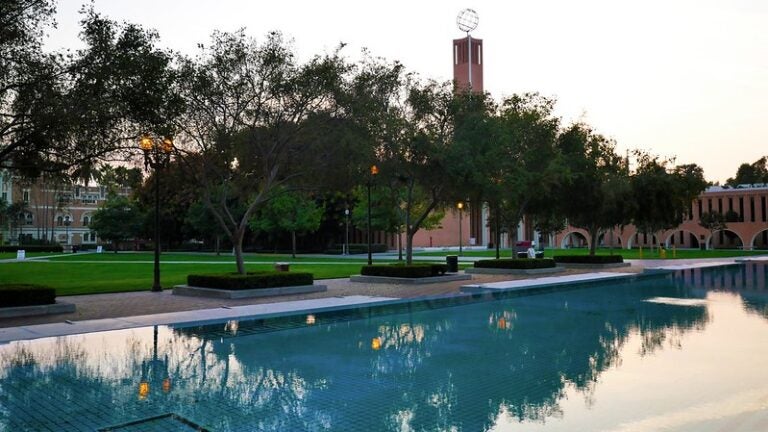Narrative Studies
What is Narrative Studies?
Narrative Studies prepares students for the development and evaluation of original content for novels, films, theatre and other narrative platforms, but recognizes that the range of professional opportunities in literature and the performing arts is much wider than the roles of author, screenwriter or playwright.
To recognize a good story, to critique, help shape, realize and transform it, requires a background in the history of narrative, cross-cultural and contemporary models, and an understanding of the broader context of popular culture.
Students need a minimum of 40 units. ENGL 270 is a newly required foundational seminar 4-unit course. This course was mandated with the intention for increased connectivity amongst the Narrative Studies cohort. Course work is drawn from departments across the humanities at USC Dornsife and from several professional schools.

Students need a minimum of 36 units (nine 4-unit courses). Course work is drawn from departments across the humanities at USC Dornsife and from several professional schools.

Building Your Major
To help develop the flexibility necessary to understand how stories change across platforms, students are expected to complete at least three courses in literary and three courses in performance-based media. The remaining three courses may be chosen to reflect the student’s personal preference and initial career aspirations.
Students must take classes to meet the following six interdisciplinary categories, plus eight units of upper-division electives and a capstone project. Click the requirement to see which courses meet each requirement.
Narrative Studies
-
The courses that meet these requirements and are being offered during the upcoming semester are underlined on the advisement record you can find on the Documents page.
-
In your exploration of narrative fields in USC Dornsife and the professional schools, you may find a course that you think should count toward your major requirements. To propose a substitution, attach a course syllabus and statement of justification to the cover sheet available on the Documents page and submit it to the staff undergraduate advisor.
Substitutions
Course offerings change, and many departments offer courses that explore narrative but do not appear on our list in the USC Catalogue. Each semester we include these options to be substituted into your major requirements.
Please inform your primary assigned advisor when you register for a substitution course, as it must be manually processed. Until you inform the staff advisor, the course will not appear on your STARS Report.
Elevate your Undergraduate Experience
-
Narrative Studies is an unusual major, which makes it perfect for study abroad. Students participating in overseas studies through USC Dornsife travel all over the world. You can choose courses from many countries, programs, and languages.
In recent semesters, students in Narrative Studies have taken classes like “The Limits of Access to Truth: Realism and Fiction in Literature and Cinema in Latin America” at the University of San Andrés in Argentina and “The Making of Modern Fantasy” at the University of Edinburgh in Scotland.
As part of your application to study abroad, you will select courses to be pre-approved by your academic advisor to meet your major requirements.
Visit dornsife.usc.edu/narrative-overseas/ to explore your opportunities abroad.
-
The capstone project is the final requirement for the Narrative Studies (NARS) major. It is a cumulative project that draws upon the classes you have completed for your major, and has both a research and a critical component. Your research component may be scholarly, literary, creative, or experiential—all subject to prior approval. Your critical component will be a self-reflective essay that explains what you have learned about narrative by researching it in the individual way that you have devised, and studying narrative in the courses you have chosen. Projects will be roughly 20-40 pages long double-spaced. Further information can be found on our Capstone Requirements Info Sheet.
Students have explored the process of adapting English literature to musicals for the stage, analyzed Hawaiian folklore and its historical forms, and researched contemporary wall mural narratives in the San Fernando Valley, just to name a few examples.
-
Each semester, Narrative Studies majors present their capstone projects to faculty, peers, family, and friends at our capstone presentation event in the Department of English.
How do I propose my capstone project?
Develop your proposal the semester before you plan to complete your capstone project. Meet with your faculty supervisor to form your proposal, and format it using the template on the Documents page. -
Our students complete internships and volunteerships tutoring students at neighborhood elementary schools, working at marketing firms, assisting in faculty research, and working at film and television production companies. These opportunities complement the intensive study and professionalization on campus in classes and co-curricular activities, and they guide students toward the diverse set of careers open to those with liberal arts educations.
Students can find these opportunities through the USC Career Center at careers.usc.edu, and students majoring in Narrative Studies are eligible to apply for the USC Dornsife Gateway Internship Program.
-
Students majoring in Narrative Studies are eligible to apply to our progressive degree program in Literary Editing and Publishing and earn both their bachelor’s and master’s degrees from USC Dornsife in just five years.
-
Graduates of our program in Narrative Studies have won Fulbright Fellowships, taught English overseas, pursued graduate school and research, published creative writing, and worked in communications and media.
Please share your stories, updates, and projects with us by contacting our undergraduate student coordinators.
Additional Resources
For advisement and to declare a major in the Department of English, please contact one of our undergraduate student coordinators.
Contact Details
USC Department of English
3501 Trousdale Parkway
Taper Hall of Humanities 404
Los Angeles, CA 90089-0354
